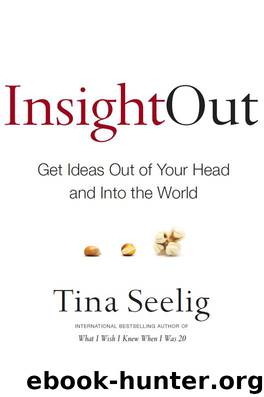Insight Out: Get Ideas Out of Your Head and Into the World by Seelig Tina

Author:Seelig, Tina [Seelig, Tina]
Language: eng
Format: azw3
Publisher: HarperCollins
Published: 2015-05-26T04:00:00+00:00
Greg uses the examples of both Bill Gates and Warren Buffett, both of whom acknowledge that the key to their success is the ability to do both types of focus—noun and verb. They see themselves as “editors in chief,” selecting the things that deserve focus. Greg writes:
Focusing on what is essential is a powerful ability, perhaps the most powerful in a world where we are so bombarded with distracting ideas, information and opinions. However, if we want to consistently give our energies to what is essential we need to develop both kinds of focus. Only in this way can we answer with confidence the question, “What’s important now?”
This resonates with the classic work of Stephen Covey, who wrote The Seven Habits of Highly Successful People. He argues that success comes from understanding the importance and urgency of everything we do. In his model, there are four categories of activities: urgent and important, urgent and unimportant, not urgent and important, and not urgent and not important. Covey argues that 90 percent of people spend most of their time on things that are urgent and important, and 10 percent of their time “vegging out” on non-urgent and unimportant activities. Others spend most of their time doing things that are urgent but not important. They think they are doing something useful, but are really just wasting time.
Covey says that effective people focus on activities that are important, even if they aren’t urgent. Though it might seem counterintuitive, he urges people to spend most of their time on activities that are important but not urgent. This includes planning for the future and building relationships. This way, you prepare for the future and get all your work completed. Covey says that, if you did this, “your effectiveness would increase dramatically. Your crises and problems would shrink to manageable proportions because you would be thinking ahead, working on the roots.”
There are several tactical things you can do to help you focus on the most important tasks. One is having a clean, clear workspace. When your space is a mess, the clutter puts a significant cognitive load on your brain. Researchers at Princeton and the University of Illinois have demonstrated, using functional magnetic resonance imaging (fMRI), that the more things there are fighting for your attention, the less able you are to focus, and the more stressed you become. Essentially, when our world is cluttered, so are our thoughts.
We can look to top chefs for inspiration. They have developed a process called mise-en-place, a French phrase that refers to the practice of gathering and arranging all necessary ingredients before they begin cooking. The practice, which eliminates unwanted distractions, results in both discipline and focus. For many chefs, this practice spills over into their lives outside the kitchen. They internalize the philosophy, making sure that they prioritize every minute and every resource even when they aren’t cooking.
In addition to decluttering your workspace to improve focus, you can make sure that the mind occupying that workspace is sharp and recharged.
Download
This site does not store any files on its server. We only index and link to content provided by other sites. Please contact the content providers to delete copyright contents if any and email us, we'll remove relevant links or contents immediately.
Big Magic: Creative Living Beyond Fear by Elizabeth Gilbert(5721)
Paper Towns by Green John(5160)
On Writing A Memoir of the Craft by Stephen King(4909)
The Doodle Revolution by Sunni Brown(4725)
Hyperfocus by Chris Bailey(4097)
Evolve Your Brain by Joe Dispenza(3650)
Unlabel: Selling You Without Selling Out by Marc Ecko(3637)
The Red Files by Lee Winter(3399)
Draw Your Day by Samantha Dion Baker(3331)
The Power of Mindful Learning by Ellen J. Langer(3208)
The Art of Dramatic Writing: Its Basis in the Creative Interpretation of Human Motives by Egri Lajos(3047)
The War Of Art by Steven Pressfield(2931)
Applied Empathy by Michael Ventura(2878)
The 46 Rules of Genius: An Innovator's Guide to Creativity (Voices That Matter) by Marty Neumeier(2828)
How to be More Interesting by Edward De Bono(2777)
Keep Going by Austin Kleon(2745)
Why I Am Not a Feminist by Jessa Crispin(2736)
How to Stop Worrying and Start Living by Dale Carnegie(2701)
You Are Not So Smart by David McRaney(2635)
